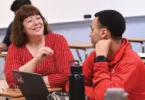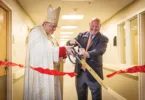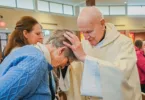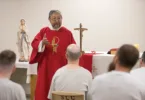by Joe Bollig
joe.bollig@theleaven.org
KANSAS CITY, Kan. — You’re sitting in a lunchroom with your co-workers, in class with other students, or with people you’ve just met in a social setting, when the discussion turns to some social issue or controversy.
You, informed by your Catholic faith, confidently throw your two cents in, only to have someone turn to you and utter: “Hey, you can’t say that. America is about separation of church and state — no religion in politics.”
Brendan Sweetman, however, would beg to differ. He believes religious views are not only appropriate in politics, but necessary.
Sweetman, a professor of philosophy at Rockhurst University in Kansas City, Mo., presents his ideas in his book “Why Politics Needs Religion: The Place of Religious Arguments in the Public Square” (Intervarsity Press, 2006).
The thesis of his book is that it is entirely appropriate to bring religious views into public discourse. Religious voices enrich these discussions; their exclusion harms democracy.
“There is a presumption in modern democracies that you shouldn’t bring your religious worldview into politics, that there’s something not quite right about that,” said Sweetman. He defines “worldview” as “one’s beliefs and values, and the outlook and lifestyles these beliefs and values support.”
It hasn’t always been that way, but in the last 50 years or so, he said, the U. S. Constitution has been reinterpreted in such a way as to exclude religion from politics and the public square. This reinterpretation has coincided with the rise of a secularist worldview, adopted and promoted by elites in academia, law, government, and media.
“Given that secularism is a major worldview, it’s no longer appropriate to discriminate against a religious worldview in politics,” said Sweetman.
If the secularist is going to say that religious worldviews are not appropriate in politics, he or she has to give a persuasive reason. It is not sufficient that they simply disagree, said Sweetman; that in itself is not an argument.
“People disagree all the time,” said Sweetman. “The essence of a free society is that you can have a public square debate [about competing ideas].”
In developing his argument for competing worldviews in the public square, Sweetman assumes that this exchange occurs in the context of a liberal, pluralist, democratic society.
He also draws a line against doctrinal religious beliefs being part of the exchange. For example, it will not do to quote the Bible or the Quran to prove something is right or wrong. Instead, reasoned and reasonable arguments must be offered.
“If you bring a religious belief into politics, you should do your best to show that it is a reasonable belief,” said Sweetman. “A reasonable belief would be a belief where you try to offer arguments for it.”
Sweetman’s “reasonable” standard applies to secularists as well as people of faith.
“Secularism has many beliefs that are based on faith, such as: ‘Everything that exists is physical in nature,’” said Sweetman. “Or: ‘Only matter exists; there’s no soul, or heaven and hell.’ They can’t prove that — they have to commit to that. That doesn’t mean it’s irrational. I’m just pointing out that [the secularist] commits to it the way the religious believer commits to belief in God.”
Sweetman doesn’t think that the potential for stalemate is a legitimate reason to discriminate against the religious worldview.
“It’s a problem of pluralism, and it’s not particular to religious belief,” he said. “You can’t solve it by just saying, ‘We’re going to exclude the religious worldview.’
“In the end, you just have to have a debate and a vote. In a democracy, the best way is to have a vote.”






